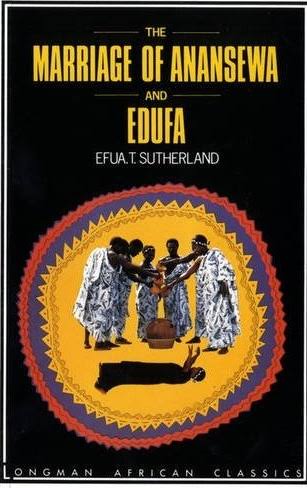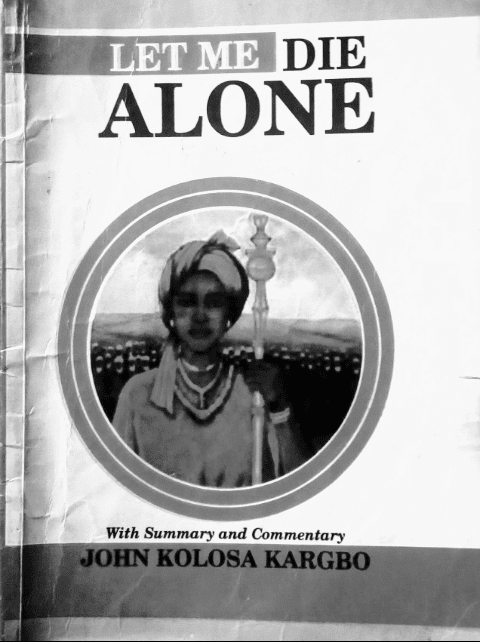There are a lot of messages and issues relayed in Dele Charley’s The Blood of a Stranger. The play focuses on the issues of betrayal, colonial exploitation, and the complicity of Africans in the enslavement of their fellow Africans. Other themes in The Blood of a Stranger include deceit, abuse of power, gullibility, patriotism, murder, and cultural rigidity.
Betrayal
Betrayal is a major theme in The Blood of a Stranger. We see leaders betray the trust their followers have reposed in them. Maligu for one is projected as a chronic betrayer.
First, he betrays the people, his king and then his position as the chief adviser when he conspires with the white man, Mr Whitehead to exploit Mandoland of its natural resources under the guise of tobacco farming.
Maligu will also betray his white collaborator when the latter is confronted with Kindo’s spear. Maligu chooses the diamonds in place of Mr Whitehead who informs him about the diamonds in the first place. Maligu has before this betrayed Soko, the chief priest. He is complicit in Soko’s assassination.
Soko is another termed betrayer in the play. He also betrays his people’s trust in him as the medium between the gods and the people.
Mr Whitehead also betrays Parker, his right-hand man. He deliberately pushes Parker to his own death by asking him to kill Soko. To Whitehead, Parker is just a pawn in his stratagem to put Kindo out of the way.
Colonial Exploitation
The scourge of colonial exploitation is expressed through the character of Mr Whitehead.
Like many of his contemporaries, he comes to Mando feigning the desire to add value to his host community. He expresses his intent of farming tobacco in Mandoland. He promises to build school for children of the land from the proceeds of tobacco.
These are good intentions. Economic growth, job opportunities, and education. These could project Mandoland in a different way.
But this is not meant to be so because the white man’s true intent is to exploit the unsuspecting people of Mandoland of their natural resources. Instead of bringing education, he only succeeds in injecting decadence into the value system of Mandoland. He manipulates their culture to enable his exploitation of their resources.
Mr Whitehead is no doubt a poster child of colonial exploitation in Africa.
Complicity of Africans
Before colonialism, there were the dark ages of trans-saharan and trans-atlantic slave trades respectively. The Arab and European slavers did not just come to Africa to source their merchandise on their own. They had African helpers. Africans were the ones who sold their fellow Africans into slavery. So, whenever the history of slavery is told, one can not but say Africans were complicit in the slave trade.
During colonialism too, Europeans recruited some Africans to perpetuate and protect their colonial rule. In Kenya when Mau Mau led by Dedan Kimathi were fighting for their lost lands and freedom, it was Africans like them in the Home Guard who fought back in defence of the white colonialists.
In Dele Charley’s The Blood of a Stranger, the trio of Parker, Maligu, and Soko are complicit in the atrocities committed by Mr Whitehead. Parker, a black native, is the white man’s obedient dog who can’t distinguish between a message meant to be delivered and one not meant to. Maligu and Soko are the trusted chiefs who allow Mr Whitehead entry into Mandoland on the ground of deception. They also throw away their garments of honour when they bring Wara to Mr Whitehead to be raped. They are complicit in the shameless display by the intoxicated people of Mandoland. They supply the intoxicants under the strict instruction of Mr Whitehead.
- Characterisation in Dele Charley’s “The Blood of a Stranger”
- Plot Summary of Dele Charley’s THE BLOOD OF A STRANGER
Deceit
Deceit is a an important theme in Dele Charley’s The Blood of a Stranger. Maligu in connivance with Soko deceives the people about the coming white man.
Soko lies that the gods have instructed the people of Mandoland to accept the stranger with open arms. He also concocts some sacrifice requirements to validate his lie.
Maligu also lies about the content of the letter of his brother from the city. He says the white man is coming to farm tobacco. When Kindo asks to read the letter, Maligu refuses to let go of the letter. What this translates to is that Maligu is not saying the whole truth.
Through deception, these two bring Mandoland under the bondage of Mr Whitehead and through the spate of resultant moral decadence, attempted rape, and murders.
In the event of Soko’s murder, Maligu employs deceit again. He tries to fit into Soko’s priestly role so no one will know nothing is amiss. Instead of the blood of a virgin stranger, he uses the blood of a goat instead. This charade would have gone unnoticed if not for the intervention of Kindo.
Abuse of Power
Abuse of power is another important theme in The Blood of a Stranger. Some of the highly placed individuals in the play abuse the powers their respected offices afforded them.
There is Maligu, a literate and the chief adviser to the king. He uses his office as the chief adviser to manipulate the king and the people of Mandoland into accepting a white man. Through the influence of his office, he is able to thwart the will of the gods to suit his plan.
There is Soko, the chief priest, who in secret does not conform to some dictates of the tradition. He allows himself to be manipulated by Maligu. Soko delivers a false prophecy about the coming of a stranger and the gods’ endorsement. This is a script handed to him by Maligu.
By choosing to deliver a false prophecy, Soko has abused his power. The people believe he is the voice of the gods. He abuses this confidence reposed in him.
It is also in travesty of his office as the chief priest and the upholder of the land’s customs and traditions that he chooses to be part of the plan to kidnap Wara for the white man to satisfy his carnal desires.
There is Kindo, the chief warrior and the heir apparent to the throne, who takes laws to his hands and kills Parker on spot for killing Soko. While he is fighting a just cause, the right thing to do is to bring Parker to the king and his council of chiefs of which he is one for a proper trial. By killing Parker, he only hands both Mr Whitehead and Maligu victory on a platter of gold.
Gullibility
Theme of gullibility is very pronounced in the play. King Santigi V is a very gullible king. He is an easily deceived leader.
He takes everything Soko and Maligu tell him hook, line and sinker. Kindo tries to dissuade him from believing Soko’s prophecy but he doesn’t listen to Kindo. He doesn’t see anything unusual about Maligu’s refusal to allow Kindo read the letter about the coming of the white man.
It is this gullibility that makes it easy for a total stranger to give him lectures on the customs and traditions of Mandoland, manipulating him to send his son to exile.
Patriotism
The theme of patriotism is exemplified by Kindo. He is just about the only patriotic citizen of Mandoland in the play. He genuinely cares for the welfare of Mando and its people.
He first demonstrates this as the chief warrior of the land. His principal responsibility is to defend the land from external threats. As the heir apparent to the throne, he could have chosen the luxurious life of a prince over the stoic life of a warrior. His love for his land and his people prevails.
Kindo’s constant policing of the activities of Maligu and Soko is also demonstrative of his patriotism. At first, he might have appeared queer but his suspicions that Maligu and Soko are up to no good are justified much later.
When the people of Mandoland start misbehaving due to the intoxicants given to them by Mr Whitehead, Kindo goes directly to Mr Whitehead and orders him to stop the madness.
It is this patriotic zeal that made him kill Parker for killing Soko. And when his father expels him from the community, he crushes Mr Whitehead’s victory by leading him to his death. He must have done this with the foreknowledge that his father is a weak and easily-manipulated leader and might not be able to exact the right justice on the white man.
Murder
Murder is an another issue touched in The Blood of a Stranger. There are notably three murders in the play.
The first is the murder of Soko. When Soko wants out, Mr Whitehead arranges for Soko to be killed. He sends Parker to kill Soko. He plans Soko’s murder in such a way that Parker would be caught and killed by Kindo.
The second murder is that of Parker. After killing Soko, Parker too is murdered by Kindo.
The third murder is that of Mr Whitehead. After the white man has convinced the king to send his son on exile, Kindo kills him for being the brainchild behind the evils in Mandoland.
Cultural Rigidity
King Santigi V is a culturally rigid leader. Man makes cultures, not the other way round. But not King Santigi V. He is driven by dictates of customs and traditions.
It is this cultural rigidity that drives him to send his son on exile and later on disown him for doing the right thing and what is best for the people of Mandoland.
 WHATSAPP: Click HERE to join the new Literature PADI WhatsApp group to receive latest updates on your phone and for further literary discussions!
WHATSAPP: Click HERE to join the new Literature PADI WhatsApp group to receive latest updates on your phone and for further literary discussions!










